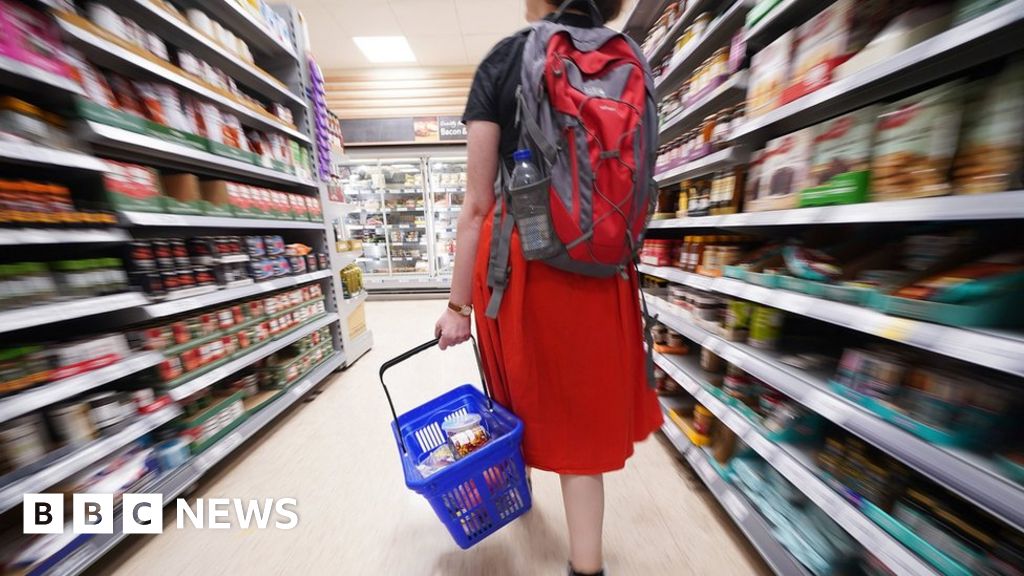Tesco Sees Early Signs Inflation Is Starting To Ease

Tesco's boss has said there are "encouraging early signs" that price rises are easing as the retail giant reported higher sales.
Ken Murphy said he was "very conscious" of the financial pressure on shoppers, but hit back at claims that the supermarket was profiteering.
The chief executive said he believed it was unfair for grocers to be blamed for inflation remaining at a high level.
Latest figures showed food inflation hit 19.1% in the year to April.
The rate at which food prices are rising has been pointed out as one reason why the inflation rate for all consumer goods is not falling as quickly as expected, with prices still 8.7% higher than a year ago.
Critics have accused food retailers of "greedflation" - putting prices up to bolster profits - and the competition watchdog is looking into whether a "failure in competition" means customers are overpaying.
Mr Murphy denied Tesco, the UK's largest supermarket, was profiteering, adding: "There are encouraging early signs that inflation is starting to ease across the market."
He told shareholders at the company's annual general meeting that the "headline" food inflation figure was "dramatically lower" at Tesco in terms of the "true" prices customers face.
Earlier this week, the governor of the Bank of England, who is trying to reduce inflation to its target of 2%, said inflation was taking "a lot longer than expected" to come down.
Andrew Bailey said this was due to food price inflation being slower to drop than global commodity prices, despite past reassurances from the Bank's contacts in the retail industry that prices would fall.
"We've been told for some time, you know, they've reached their peak, they're going to come down, the rate of inflation is going to come down. And then the contacts come back and say, 'Sorry, we got that one wrong,'" Mr Bailey said.
Tesco's Mr Murphy said he believed the Bank of England had been unfair in blaming supermarkets for inflation remaining at a high level.
Purchasing power
Mr Murphy said the retailer had "led the way" in cutting prices on staple goods such as milk, pasta and cooking oil.
He added there were several factors contributing to food inflation, but when commodity prices have come down, the "grocery industry has been very quick to pass on those savings to consumers".
The Tesco boss said prices were "unlikely" to return to the levels they were prior to Russia's invasion of Ukraine, known as the bread basket of Europe, but pointed out that wages were "materially higher than they were two years ago".
"What's important here is the purchasing power of the family," he added. "That's really where we should be focused on improving people's purchasing power so that they can continue to feed their families and live a decent life."
Last month, Sainsbury's hit back after accusations of bolstering profits at a time when many households are struggling with higher prices.
Mr Murphy's comments came as Tesco released its latest trading update, showing that in the three months to the end of May sales in the UK were up 9% from a year earlier to £10.8bn.
Charles Allen, a retail analyst at Bloomberg Intelligence, told the BBC's Today programme that inflation was a "huge factor" in Tesco's latest figures.
"The top commodity prices are starting to fall but it's important to remember that lower inflation doesn't mean deflation. It doesn't mean prices dropping, it just means prices going up less fast."
On a call with reporters, Mr Murphy also said Tesco's board had "acted in the best interests" of the company regarding the departure of its chairman John Allan.
He has strongly denied three of four claims made against him.
"It was a difficult decision but at the same time, I think it coincides with the fact that the search for a new chairman was already well under way," Mr Murphy said.
From Chip War To Cloud War: The Next Frontier In Global Tech Competition
The global chip war, characterized by intense competition among nations and corporations for supremacy in semiconductor ... Read more
The High Stakes Of Tech Regulation: Security Risks And Market Dynamics
The influence of tech giants in the global economy continues to grow, raising crucial questions about how to balance sec... Read more
The Tyranny Of Instagram Interiors: Why It's Time To Break Free From Algorithm-Driven Aesthetics
Instagram has become a dominant force in shaping interior design trends, offering a seemingly endless stream of inspirat... Read more
The Data Crunch In AI: Strategies For Sustainability
Exploring solutions to the imminent exhaustion of internet data for AI training.As the artificial intelligence (AI) indu... Read more
Google Abandons Four-Year Effort To Remove Cookies From Chrome Browser
After four years of dedicated effort, Google has decided to abandon its plan to remove third-party cookies from its Chro... Read more
LinkedIn Embraces AI And Gamification To Drive User Engagement And Revenue
In an effort to tackle slowing revenue growth and enhance user engagement, LinkedIn is turning to artificial intelligenc... Read more

